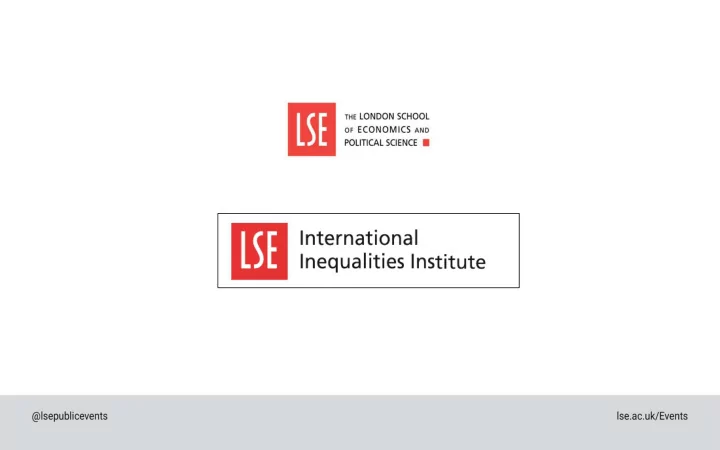

Parents, Poverty and the State #LSECare Naomi Eisenstadt JRF Practitioner Fellow at the International Inequalities Institute. Carey Oppenheim JRF Practitioner Fellow at the International Inequalities Institute. Ryan Shorthouse Director of Bright Blue Matthew Taylor Chief Exec of RSA Chair: Professor John Hills Richard Titmuss Professor of Social Policy Department of Social Policy Thursday 10 th October 2019 6.30pm to 8.00pm, Hong Kong Theatre, Clement No Ticket Required House
Parents, Poverty and the State Government’s role? Naomi Eisenstadt and Carey Oppenheim LSE 10 th October 2019 3
Growing role of government in family life: supporting parents and parenting Enhance capabilities Information and guidance Reduce pressures Skills and training Rights and legal protection Intervention Financial support All families Support in kind Before and after birth, midwife and health visitor support Access to maternity and paternity leave early years provision Flexible working and childcare Some families who seek help Targeted benefits Parenting initiatives Highest Risk Families Troubled families programme Family Nurse Partnerships Intervening to safeguard children 4
Changing landscape: economy 5
Changing landscape: families Family type with 1997 2017 children Opposite sex 70% 62% married couple Cohabiting couple 8% 16% family Lone parent family 22% 22% Increasing but still small numbers of gay & lesbian parent families, increasing numbers of blended families 6
Changing landscape: growing employment 1997 2017 Fathers in couple 88% 92% family in work Mothers in 68% 74% couple family in work Lone parents in 45% 68% work Increasingly both parents working when children are under 5 7
Changing landscape: in work but still poor % of poor children in 1997 2017 households by economic status At least 1 adult in 44% 67% work Workless 56% 33% Black and minority ethnic groups – higher rates of poverty and poorer employment prospects 8
Parenting 9
What do children need? Focus is on children’s cognitive, social -emotional development Relationship between family resources (income, education, occupation, class) and child outcomes Early childhood matters Inequalities in development by socio-economic group emerge early Each phase of childhood/adolescence has key milestones, risks, opportunities 10
What makes a difference? Income poverty – directly in terms of ability to buy goods, services & indirectly - low income increases stress Parents matter at least as much as money. A good home learning environment is associated more strongly with child outcomes than income, education or class. Parents’ - especially mothers’ - educational background and their mental health - particularly important for how children fare. Relationships matter, not only parent – child – but between parents. Good relationships between parents in intact or separated families is a protective factor for children. 11
What has government done? Labour Coalition Conservatives • • Improvements in Expansion of • Childcare and flexibility of childcare Early Education parental leave • WW Centre- • Sure Start • Pupil premium Children’s Social • Every Child • Care Troubled Families Matters • • Investment in Early • Children’s Fund CAMHs & Intervention • Connexions relationship Foundation • Child poverty support • Education targets • Focus on workless Endowment Fund • Tax credits families impact on • Universal Credit • Minimum wage child outcomes • Austerity • Universal Credit • Austerity 12
Key features • Labour: – reducing pressures & increasing capabilities – growing economy until 2008 – focus on children & families • Coalition & Conservatives: – increasing capabilities while increasing pressures – austerity – focus on pensioners, schools, health 13
Growing role of state in family life • Conservative 1997 Manifesto: minimize unnecessary interference in family life • Conservative ex-Secretary of State for Education, Damian Hinds, 2019: ‘If we are serious about social mobility …we have to care about the home learning environment because it is going to determine the futures of a lot of those children.’ (Guardian 17 th June 2019) 14
But different views on causes, measuring high risk – poverty + disadvantages Social Exclusion Task Force : money, housing, mothers mental health DWP: workless families, family breakdown, problem debt, substance misuse Adverse Childhood Experiences : retrospective; experiences in childhood influence adult outcomes Children’s Commissioner vulnerability measures Move from mix of systems and behavioural problems to greater emphasis on behavioural problems; All useful for service planning but can be unhelpful for individual assessment. 15
Some policies do work….. Consistent evidence on benefits of high quality early education Consistent evidence that mothers and fathers spend more time with their children (although SES gap in time spent remains) Education attainment gap narrowing, but at a very slow rate Most minority groups doing well at school but continuing employment penalty Some effective early intervention programmes – challenge of replication Income transfers reduced child poverty; benefit cuts increase child poverty 16
Tensions to be managed Understanding a problem is not solving it; implementation is much harder than design UK, National, local, neighbourhood? Top down or bottom up? Targeting, open-access or universal services? Behavioural interventions and/or systems reform? 17
Where next? Reduce child poverty & grow capabilities Key entitlements: what every child, family, individual can expect from the state A public health approach: prevention, early intervention & tailored responses to high risk Flexibility to respond to dynamic nature of family life over life course Transparent & regular data collection to learn & respond 18
Where next? Finding the right balance: service interventions, income transfers and employment/labour market Solutions that address inequality as well as poverty Understanding the new realities for today’s children and young people Creating a future as good for the next generation as was done for me 19
Join us for a drink at Basement LSE Garrick Café Houghton Street 20
Parents, Poverty and the State #LSECare Naomi Eisenstadt JRF Practitioner Fellow at the International Inequalities Institute. Carey Oppenheim JRF Practitioner Fellow at the International Inequalities Institute. Ryan Shorthouse Director of Bright Blue Matthew Taylor Chief Exec of RSA Chair: Professor John Hills Richard Titmuss Professor of Social Policy Department of Social Policy Thursday 10 th October 2019 6.30pm to 8.00pm, Hong Kong Theatre, Clement No Ticket Required House
Recommend
More recommend